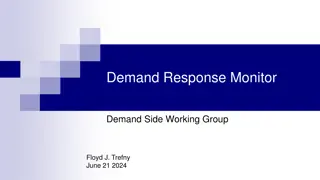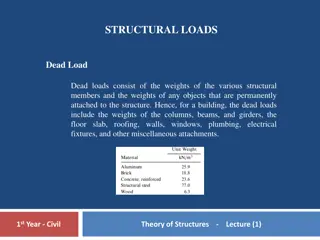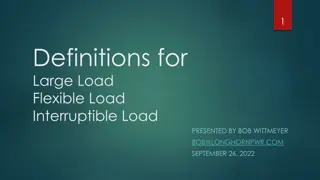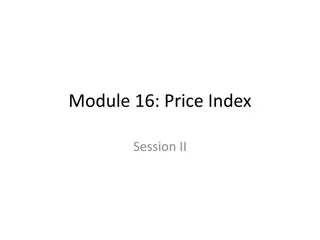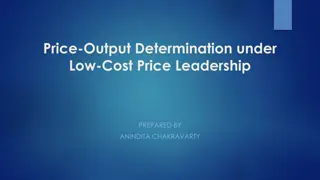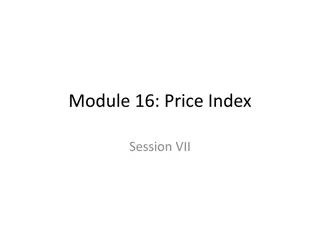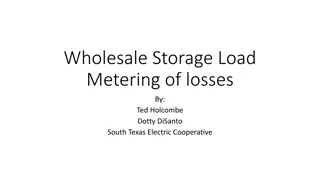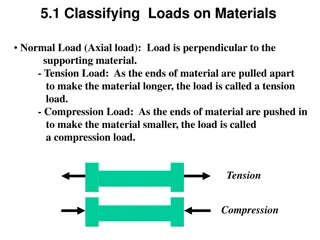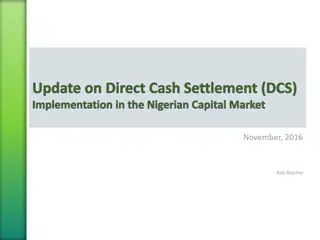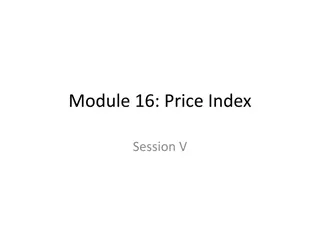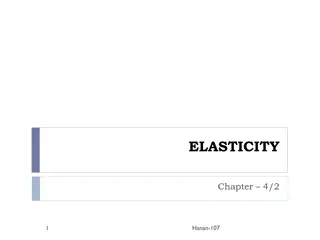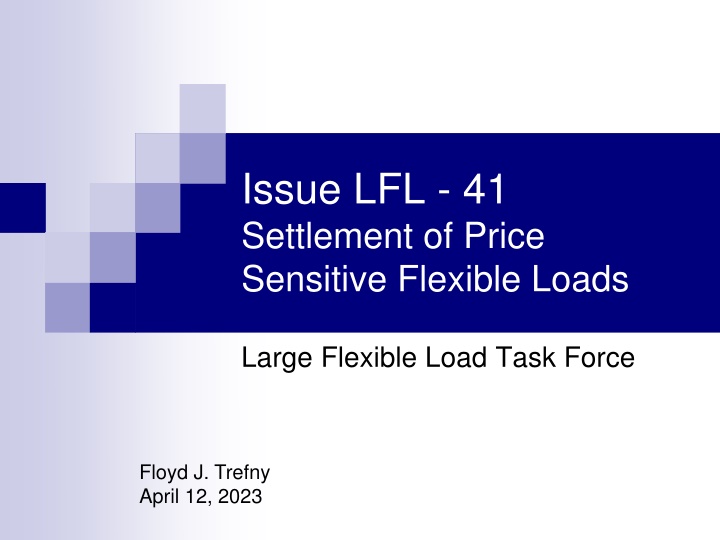
Settlement of Price Sensitive Flexible Loads Task Force
Explore the challenges in settling prices for price-sensitive flexible loads, affecting optimal demand response behavior. Discover scenarios and implications for large loads in ERCOT, shedding light on the disconnect between consumer payments and actual pricing benefits.
Download Presentation

Please find below an Image/Link to download the presentation.
The content on the website is provided AS IS for your information and personal use only. It may not be sold, licensed, or shared on other websites without obtaining consent from the author. If you encounter any issues during the download, it is possible that the publisher has removed the file from their server.
You are allowed to download the files provided on this website for personal or commercial use, subject to the condition that they are used lawfully. All files are the property of their respective owners.
The content on the website is provided AS IS for your information and personal use only. It may not be sold, licensed, or shared on other websites without obtaining consent from the author.
E N D
Presentation Transcript
Issue LFL - 41 Settlement of Price Sensitive Flexible Loads Large Flexible Load Task Force Floyd J. Trefny April 12, 2023
Background Interval Data Recorders (IDR) meters measure retail load on 15-minute intervals Load Zone Settlement Point Prices from ERCOT that retail consumers pay are based on 15-minute intervals. Calculated for each bus s load weighted average of 5-minute bus LMPs from each SCED executed during the 15-minute period These 5-minute averages are further weighted by the change in system load over the 15 minute period Retail Loads pay metered kWh multiplied by the 15- minute settlement point price There is a disconnect between what retail load pays and the 5- minute SCED prices that load may respond to Loads may not receive the proper price benefit of their demand response actions Discourages optimal demand response behavior
Loads and Interruption Scenarios Large Loads look to the ERCOT postings of the Load Zone LMP from each SCED execution as the primary indicator of the eventual settlement point price For example, a flat 152 MW load, consumes approximately 38,000 kWh every 15 minutes; 12,667 kWh for 5 minutes SCED Intervals Price* Cost Scenario load 5 10 15 15- Minute kWh Low price ($45) Low price ($45) Low price ($45) Base 12,667 12,667 12,667 38,000 $45 $1,710 *- 15-minute price assumes there is no effect from price weighting based on total load changes
Loads and Interruption Scenarios SCED Intervals Price* Cost Scenario load 5 10 15 15- Minute kWh Low price ($45) Low price ($45) Low price ($45) Base kWh 12,667 12,667 12,667 38,000 $45 $1,710 High price ($3,000) High price ($3,000) High price ($3,000) No Interruption - kWh 12,667 12,667 12,667 38,000 $3,000 $114,000 High Prices without an interruption costs significantly An interruption of consumption in the first interval yields no cost, if it can be done quickly There is a delay in seeing the SCED prices on the ERCOT webpages *- 15-minute price assumes there is no effect from price weighting based on total load changes
Loads and Interruption Scenarios SCED Intervals Price* Cost Scenario load 5 10 15 15- Minute kWh Low price ($45) Low price ($45) Low price ($45) Base kWh 12,667 12,667 12,667 38,000 $45 $1,710 High price ($3,000) High price ($3,000) High price ($3,000) No Interruption - kWh 12,667 12,667 12,667 38,000 $3,000 $114,000 Low price ($45) High price ($3,000) High price ($3,000) Interrupt second interval - kWh 12,667 0 0 12,667 $2,015 $ 25,523 High Prices in second and third interval costs even if the consumer interrupts as soon as 5- minute SCED prices are posted Consumer should only be paying $570 *- 15-minute price assumes there is no effect from price weighting based on total load changes
Loads and Interruption Scenarios SCED Intervals Price* Cost Scenario load 5 10 15 15- Minute kWh Low price ($45) Low price ($45) Low price ($45) Base 12,667 12,667 12,667 38,000 $45 $1,710 High price ($3,000) High price ($3,000) High price ($3,000) No Interruption 12,667 12,667 12,667 38,000 $3,000 $114,000 Low price ($45) High price ($3,000) High price ($3,000) Interrupt second interval 12,667 0 0 12,667 $2,015 $ 25,523 Low price ($45) Low price ($45) High price ($3,000) Interrupt third interval - kWh Consumer should only be paying $1,140 12,667 12,667 0 25,333 $1,030 $ 26,093 *- 15-minute price assumes there is no effect from price weighting based on total load changes
Fixes Generators (maybe CLRs) do not have the same problem as price responding loads Protocol section 6.6.3.1, Real-Time Energy Imbalance Payment or Charge at a Resource Node, addressed a similar problem with generation settlements ERCOT uses Base Points to adjust 15-minute energy data into 5 minute data for settlement purposes Structure of Load settlement equations make it difficult to easily change calculations for individual loads Loads are summed up individually for each QSE by LZ and then pricing is applied to result in a charge to a QSE Load Mw Telemetry can be intergrated to determine the amount of Load Mwh used for each SCED. ERCOT would make adjustments to QSE settlement equations Settle Loads that desire 5-minute settlement who install appropriate metering. Telemetry may have to be by ESID.


